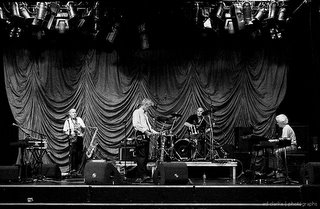
Here's a photo of Van der Graaf Generator rehearsing at Melkweg in Amsterdam last summer, a nice companion to my picture of CbJE playing at the same place, 15 years earlier (see below). I just last week received and listened to VdGG's 'Maida Vale' disc, and for a long-time fan of this band it's a revelation in a number of ways. It prompts a followup to my earlier posting. (See "A Prog-Rock classic, redux") The title refers to the BBC complex of studios (Maida Vale is a suburb of London) where the Beeb daily records bands of all sorts, choirs, orchestras, chamber goups, jazz pianists, you name it—all for broadcast. I myself played there on four separate recording sessions with Colorblind James Experience, and those sessions are a highlight of my time in the band. The amazing thing about these BBC sessions is that they take place in a single day, recording an artist or group in their live essence, but with fantastic audio quality. In my own experience, the necessity of doing everything so quickly brought out a keen spontanaety in us, and these are the only studio documents that really come close to showing the raw power that we could summon as a live band. And so it is with these BBC recordings of VdGG.
The first two tracks are from 1971, taken from their early albums, the remaining tracks are all from '75-76, when the band recorded (and released) three albums in a burnout-inducing frenzy of activity within a single year. The first two of those albums, 'Godbluff' and 'Still Life' were excellent. The third, 'World Record,' had some fine moments, but showed the signs of the band's exhaustion. At the end of their '76 tour, right after the band's only show in the USA, Hugh Banton announced he'd had enough, and this lineup disbanded. So this BBC document serves well as a sort of "best-of" collection, in addition to displaying the band's live sound.
The tracks sample some of the best compositions of the band during their "classic" heyday as a quartet. The musicians are in great form. When I played their records many years ago, I used to wonder "how did this really sound when they played it live?" Now I now know (redundancy alert). Best of all, the production is excellent, in some ways better than their studio albums. Dave Jackson's saxes and electronics are more vivid and immediate, as are Guy Evans' drums. And on the last couple of tracks, we have the only recorded documentation (that I am aware of, at least) of Hugh Banton's monster organ that he designed and built himself, which he dubbed HB1. Attempting to construct an electronic version of a church pipe organ, it has a true 32' stop, as well as some timbres that I don't recall hearing from any other electronic organ. Banton had to use special 24" speakers in order to reproduce the lowest frequencies. It's sad to know that this instrument went into storage after Banton left the band in '76, and was later lost.
Listening to these tracks now, I hear them in the light of my subsequent compositional training and experience as a rock musician. It's interesting to me how concealed the band's virtuosity is. For example, on "La Rossa" the group goes through a bewildering array of odd time-signatures, but because they are composed in support of the words and are completely text-driven, they sound utterly natural, and never draw any attention to themselves. Solo sections tend to be group efforts and rely on rhythmic accumulation rather than individual linear flights, and even with only Banton's organ and Jackson's double saxes, they were capable of fantastically dense textures; the sound is palpably thick, even opaque. I'm noticing now that many of their songs have at least two distinct tempo zones, often in an arch-form or some sort of rondo-like structure. Memorizing some of these must have been a daunting task. Jackson's saxophone electronics were quite innovative at the time, and have aged well, unlike many other players of that era whose recordings just sound gimmicky now.
My wife refers to VdGG a "boy band," not because they ever resembled 'nSync or somesuch group, but because their appeal is largely confined to male listeners. I would agree with this, and I've never met a woman who liked the band, ever. Why this is, I can't say. I do tend to listen to them when she's not around, often on headphones, so I can hear them at something close to the proper volume.
